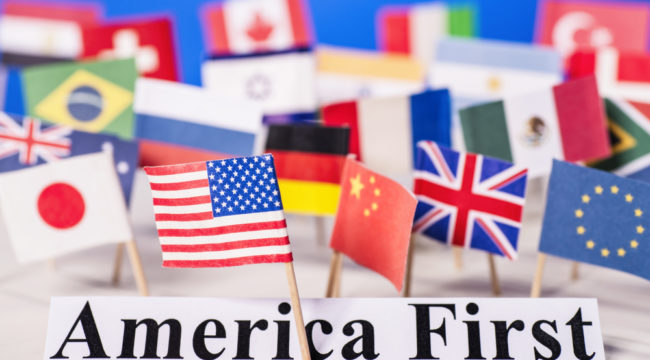Here’s Why You Shouldn’t Fear a Trade War
The Dow Jones took its eighth consecutive licking yesterday — its worst streak since last March.
Down too was the S&P… and the Nasdaq.
VIX, Wall Street’s “fear gauge,” was in panicked spasm.
For the explanation, we turn to CNBC:
“Dow drops about 200 points on trade worries, extends losing streak to eight days.”
It is the trade wars — again.
Trade-sensitive stocks such as Boeing and Caterpillar took the heaviest rattling yesterday.
“The focus has been back on tariffs,” confirms Michael Hans, CIO of Clarfeld Financial Advisors.
Meantime, Goldman Sachs thinks “further escalation seems likely.”
But in the face of trade upheaval, where can the smart investor find refuge?
Gold, perhaps… or maybe Treasuries?
Or something else altogether?
We put our agents on the case:
“Go find us an investment that will advantage our readers while trade war hammers the markets!”
Dutifully, they soon reported a beacon of light… an investment class that has soared as trade war fears shake the overall market.
“While the U.S. and China are embroiled in an escalating trade war,” affirms ETF Trends, this investment is “outperforming.”
It is “mostly immune to any external shocks,” says Zacks.
Indeed…
While the Dow Jones has lost 0.8% on the year…
And while the S&P has eked out a slender 3.1% gain, this investment class has surged as much as 13.2%.
In fact, it tallied an all-time high on Wednesday… while the overall market sank in trade-filled despair.
The asset under discussion is not gold. Or Treasuries.
Then what?
The answer is… small-cap stocks.
Small-cap stocks are the antidote to trade-war fever.
The iShares Core S&P Small-Cap ETF — which tracks the S&P Small-Cap 600 index — is up 13.2% this year.
Meantime, the iShares Russell 2000 ETF — which does duty for the small-cap Russell 2000 — is up 11.8%.
The Russell 2000 has registered 23 record highs this year… even as the overall market “corrected” 11% in February.
Interesting, you say.
But why are these small fry doing circles around the Dow Jones and the S&P?
The answer begins with the dollar.
We must first look to the stronger dollar…
Large U.S. multinationals earn vast revenues overseas — but they are earning these in weaker currencies.
When they convert these revenues from softer currencies to stronger dollars… the conversion leaves them short.
Their dollar earnings are depressed.
And according to FactSet, S&P 500 companies earn 38% of their income abroad.
On the other hand… S&P Small Cap 600 businesses only generate some 20% from overseas sales.
Thus, much of their earnings arrive in stronger dollars.
Thus their greater earnings.
Thus their greater investor appeal.
“We continue to like small-cap equities because they have a more domestic focus, [and are] less impacted by trade or dollar fluctuations,” explains Angus Sippe, fund manager at Schroders.
“Smaller companies have some natural hedges against risks like trade,” adds Tim Courtney, CIO at Exencial Wealth Advisors.
Meantime, official numbers indicate strong retail and consumer spending trends — rightly or wrongly.
And the National Federation of Independent Business reports small-business profits have notched their highest reading since records began in 1973.
This pleasant fact they attribute to the Trump tax cuts.
In summary, concludes Ryan Crane, CIO of Stephens Investment Management Group:
Small caps are being favored because they’re less exposed to foreign markets, and because they don’t have currency issues, which is becoming a problem for bigger names. Also, they should derive a disproportionate benefit from the tax bill, because the larger firms have big teams that were already working to minimize their tax burdens, so lower rates will mean less for them.
And so we rest our case on behalf of the small-cap stock.
Our default setting is one of detached indifference — we are observers, not drummers.
And detached observers we remain.
But if you wish to hunt big game right now… it appears you may wish to think small…
Regards,
Brian Maher
Managing editor, The Daily Reckoning



Comments: